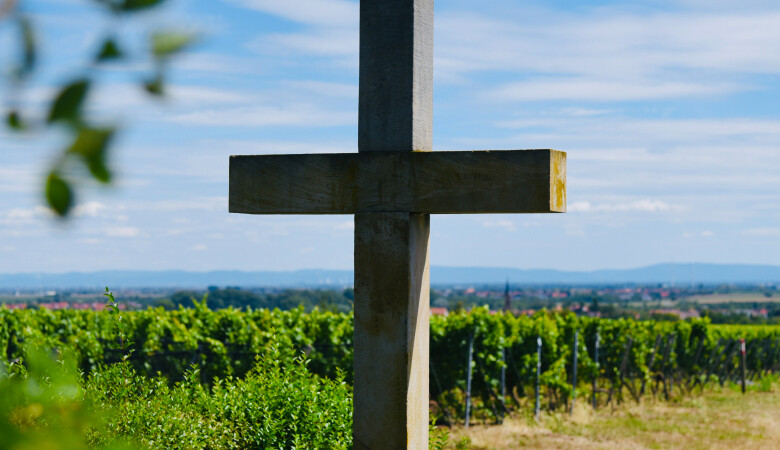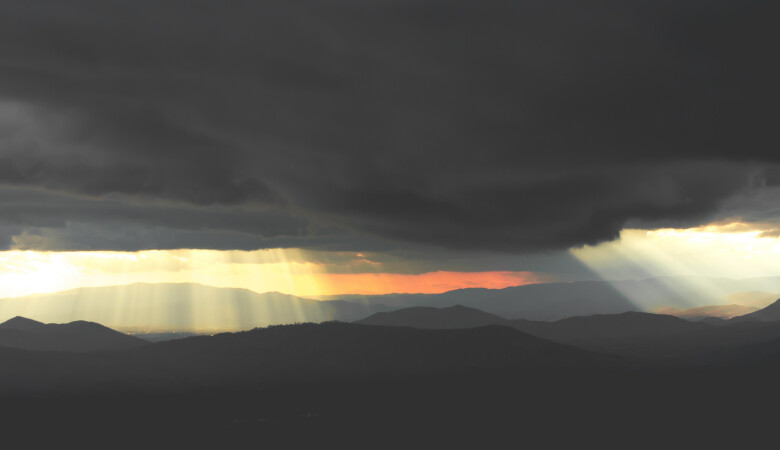The Visit of the Magi (2)
December 24, 2017 | Andy Davis
Matthew 2:1-12
Incarnation, Prophecy
Pastor Andy Davis preaches a sermon on Matthew 2:1-12 and explores the Magi's visit to Jesus Christ.
- SERMON TRANSCRIPT -
The most famous, miraculous sign in the Old Testament was the burning bush. As Moses was tending his father-in-law, Jethro's sheep, and he saw this amazing sight that broke all the laws of physics. How this bush was burning, but not consumed. Well, I want you to imagine a similar scenario in which you are hiking out West, let's say you're out in the Rockies and you're hiking up a steep mountain and you're going through the woods and you're getting tired, it's hot, and suddenly you hear a rushing mountain stream, vigorous rushing mountain stream. And so you make your way through the woods to the stream, only when you get there, you see something you can't... It defies all the laws of nature, all the laws of physics. The stream's going up the mountain.
What would you think? What would you think if you stood there? You'd be like, "I don't know if I would drink from it, I would be so stupefied. I'd be like, "Is it water? Is it healthy? What could I do? What should I do?" I'd just stand there in amazement. Isaiah chapter 2:2 gives a prophecy of the success of the Gospel in that kind of an image. In Isaiah 2:2 it says, "In the last days, the mountain of the Lord's temple will be established as chief among the mountains. It'd be raised above the hills and all the nations will stream to it. And many peoples will say in that day, "Come, let us go up to the mountain of the Lord, to the house of the God of Jacob. He will teach us His ways and show us his laws, we will walk in the light of His laws. The law will go out from Zion, the word of the Lord from Jerusalem and all the nations will see it, and they will beat their swords into plowshares and their spears into pruning hooks, and they will not learn war anymore. Come, oh house of Jacob, let us walk in the light of the Lord."”
So here's this image of a mighty river flowing up a mountain, the highest mountain in the world, even. How would we explain it? Well, it has to do, I think, with the success of the gospel to the ends of the earth as people come to faith in Christ and they make spiritual pilgrimages to Christ. Spiritual pilgrimages. They don't need to physically go anywhere. And the idea of water running, rushing up a steep mountain defies all the laws of physics, it's not a natural streaming. It's a supernatural streaming. It can only be affected by supernatural forces on the people that are making the pilgrimage. Nothing but a supernatural force will cause them to leave their old way of thinking, to leave their old way of worshipping, their old value system, and make a pilgrimage to Christ to come to Christ.
Now for me, I love those stories, I love hearing the stories of how brothers and sisters in Christ from all over the world came to faith in Jesus, especially if there are signal providences, amazing signs, visions, dreams, other things involved. A few weeks ago we gave you in an insert, a prayer, a week of prayer, a guide from the IMB. And there was a story in there of a woman given the name Delara from Central Asia. We're not told her country, we're not told her real name. But we are told the circumstances of her, a Muslim woman, coming to faith in Christ. She had a dream and in that dream she saw a structure she'd never seen before and three men there in front of that structure who she didn't know. But in the dream, she knew one person, Jesus, and Jesus lifted her up in her dream, out of her bed, set her on her feet, and invited her to come to this building. And then she woke up. Within the next week, she was in a certain part of the city and there she saw the building and it was a church. She'd never been there before, but it was definitely that place. And she went inside and the three men were there, including one man who spoke to her and led her to Christ.
Now, I'm gonna get to heaven, I'm gonna hear 100 million stories like that, of how the nations streamed up against all odds, against every inclination of the sinful human heart, against all of the teachings of their native religions, whatever they were, to come to faith in Christ. A few weeks ago, I was meeting with a woman who is serving as a missionary in North Africa, in a Muslim country in North Africa. She told me a similar story, this is remarkable. Of a man who came to faith in Christ, a Muslim man, who had just within the last year been a member of an ISIS cell group, preparing... And he was preparing for a suicide bombing mission. And he was training and preparing for this. And he was told he had to go to Mecca, make his Hajj, his pilgrimage to Mecca, to purify himself for his entry into paradise.
So he went on the pilgrimage, but when he got there he could find no transportation to the Kaaba, the Black Stone that all the Muslims go around seven times counter clock-wise, that's the consummation of their pilgrimage. He couldn't get there, he couldn't get... I don't know, from the airport or exactly, I don't know the details, but he couldn't get there. There was no bus, there was no taxi, there was no way to get there.
Finally, this little bus comes and the door opens and there's this man there, and he says, "I'm trying to get to the Kaaba" and this man looks at him for a long time, doesn't say anything, just looks and he says, "You're going the wrong direction." "Beg your pardon?" "You're going the wrong direction." That's all he said. Door closed, drives off. Wow, that was unnerving. He somehow found a way to complete his Hajj, went back to his home country. A few weeks before he was to die in a murderous suicide bombing in the name of Allah. He went to the home of a Christian for dinner, someone he knew, and when he got there, on the wall, there was a picture there of the Last Supper. He was immediately fascinated, he said, "Who is that man in the middle?" "Well, that's Isa, that's Jesus." He said, "No, that was the driver of that bus." Now, you're like, "What did Jesus look like?" And don't go there. It doesn't matter. What matters is that was the man he saw. And he knew what he was doing was sinful, it was wrong. He knew he was going the wrong way, he had no peace in his heart. And so, from the Muslim context of honor and respect for Jesus, even beyond that, to the fact that Jesus actually is not merely a prophet who did miracles, but actually God in the flesh, he was led to faith in Christ. And then told the rest of the story to his brothers and sisters there in his home country.
Now for me, I love to hear those kinds of stories, I wanna know what God does to bring someone from point A to point B, to bring them to faith in Christ. Now, the account we're gonna read today of the Magi is one of the first such stories, maybe the first, of a pilgrimage made from a distant land by Gentiles, pagans, to come to worship Jesus. And so we're gonna walk through that this morning.
I. Endless Fascination with the Magi
Now, we have an endless fascination with the Magi, which is part of the Christmas scene, and we are interested in it. And so you're probably wanting to know what I'm going to say about the Magi, you're hoping I'm not gonna touch too sharply on your nativity set. Well, I'm probably gonna mess with your nativity set a little bit, and mine too. But we're gonna find out about the Magi.
Now, Christmas is filled with all kinds of images and we know it's powerful, it's a powerful force in our culture. Very strong feelings. Some of those forces are good, some are not so good. Christian parents would do well to saturate the minds of their children in the theological truths of the birth of Christ, to tell them the truth about who Jesus was. You heard Wes reading John 1:1, "In the beginning was the Word and the Word was with God and the Word was God." He was with God in the beginning, all things were made through him. A number of verses later, verse 14, "The Word became flesh and made His dwelling among us, and we have seen his glory, the glory of the only begotten, from the Father, full of grace and truth." A few verses after that, "The law was given through Moses, grace, and truth came through Jesus Christ."
"Christian parents would do well to saturate the minds of their children in the theological truths of the birth of Christ, to tell them the truth about who Jesus was."
We're not wondering who he's talking about at all in John 1. So for us as Christian parents, to just saturate the minds of our children and say, "Teach them this, teach them who Jesus is, that He is God in the flesh." And teach them why he came. 1 Timothy 1:15, "This is a trustworthy saying that deserves full acceptance: Christ Jesus came into the world to save sinners, of whom I am the worst." That's a great verse, year-round. Cherish that verse. Christ Jesus came into the world to save sinners of whom I am the worst. If you ever feel like the worst sinner, that's your verse. That's why he came. Now, the biblical images of Christ are powerful enough to consume our imaginations, our minds for the rest of our lives. We don't need all of the other myths and legends. Luke 1:30-33, which we looked at last week a little bit, where the angel Gabriel said, "Do not be afraid, Mary, you have found favor or grace with God. You will be with child and give birth to a son and you are to give him the name Jesus. He will be great and will be called the Son of the Most High. The Lord God will give Him the throne of his father, David, and He will reign over the house of Jacob forever." Son of God, Son of David, the incarnation. And then the angel appearing to the shepherds outside Bethlehem, "Today in the town of David, a Savior has been born for you." Isn't that powerful? A savior for you, and he is Christ the Lord. And this will be a sign to you, you will find a baby wrapped in cloths and lying in a manger.
So this is the theology of Christmas, the incarnation, the idea that God became human and came to save us from our sins. Now we know that there are overwhelming images, many of them secular, lining up with Christmas. I'll like to count all of the different phrases that you hear on the radio as you're listening to seasonal music. So it is the most wonderful time of the year. Silver bells. I've personally never seen chestnuts roasting on an open fire, I don't know what happens. I would picture they would explode, but I don't know.
And then you've got the other weird things that entered somewhere around when I was a little kid, like the Grinch and the Snow Queen and the elves and all that sort of stuff that come in with those TV programs that come in every year. Then you've got Ebenezer Scrooge and the three ghosts, past, present and future. I saw recently, a movie, The Man Who Invented Christmas. Some of you have seen that, about Dickens and the circumstances of him writing The Christmas Carol. And it's just striking how unimportant Christmas was in Victorian England back before that time. But it was really Queen Victoria and Prince Albert and then Dickens in the story that made it huge. So just all of these images. And then there are other threads that are theological, like the hymn we just sang, "Hark! The Herald Angels Sing" is the most... I think the most theologically rich Christmas carol we ever sing. "Christ by highest heaven adored Christ the everlasting Lord. Laid in time, behold him come, offspring of a virgin's womb. Veiled in flesh, the godhead, see. Hail the incarnate deity." Incarnate deity. "Pleased as man with man to dwell, Jesus our Immanuel."
What you may not realize is Charles Wesley wrote maybe dozens of verses to that and those were the best. The four that we know are the best. Wes chose a few extra. Where did you find those? You have to ask him. Where did you find out about the second Adam? That was amazing. But I know that Charles Wesley wrote more than made it in the hymnal. Very rich and powerful, and so we should saturate ourselves in it.
Now when we come to the Magi, there are lots of misconceptions. So here I have to go there, I have to talk about the nativity sets. So there we see Joseph, Mary, baby Jesus, the shepherds, that's all good. A barn, maybe, might have been in a cave, but barn, manger, fine. And there they are, the three kings, alright? And they're in rich kingly robes and they've all got different ornate boxes and they're offering... I've got it too. I set it out every year without any pangs of conscience at all.
Now honestly, the number of the Magi is unclear. Because they gave three gifts we think there are three of them, we don't know. The Magi are not in any way said to be kings in the account. They're Magi. Talk about what that means in a moment. Those two misconceptions come together in a very famous Christmas carol, "We Three Kings... " You know that one, "We three Kings of Orient are bearing gifts, we traverse afar. Field and fountain, moor and mountain, following yonder star." In the 14th century, a cleric named John of Hildesheim wrote a work called "The History of The Three Kings." So you can look it up, you can get some of the text online, it's public domain at this point.
He included some details about the star they followed, details that are not found in the Bible. He gave us their three names, Melchior, Balthasar, and Gaspar. They were said to be kings of Ind, Chaldea, and Persia. They chanced to meet on the outskirts of Jerusalem, all of them guided by the star, they bumped into each other and then they proceeded together to Bethlehem where they presented their gifts. They departed back together to the border of the ancient realm of Ind, where a watchtower is maintained, that's where the star had first been sighted. On and on, this account goes. Turned out that all three of the kings returned to the watchtower on the border of Ind, and there they built a large and ornate tomb for themselves and they all died on the same day and were buried in that tomb.
Well, so much for John of Hildesheim's account. In the city of Cologne, Germany, you can go and actually find supposedly the bones of all three kings. So, if you wanna make a pilgrimage to Cologne, Germany, and go to the shrine of the three kings, there are some bones. I don't know whose bones they are, but there are some bones there. But today, I think it's better for us to walk through the biblical account and see what Matthew tells us and what timeless lessons we can take from this beautiful narrative.
II. Walking Through the Biblical Account
So let's begin at verse 1 of chapter 2 of Matthew. Verses 1-2, "After Jesus was born in Bethlehem, in Judea, during the time of King Herod, Magi from the east came to Jerusalem and asked, 'Where is the one who has been born King of the Jews? We saw his star in the east and have come to worship Him.'" So this occurs some time after the birth of Christ. The only account we have of that, of course, is Luke 2, which I've already cited a little bit, the account of the shepherds, the angelic visiting, the army, the host of heaven, the glory of God.
Here in this text, the time is set as the reign of King Herod, Herod the Great. Herod was a thoroughly evil man. He was paranoid, he was insecure, very powerful. Under his rule, the Temple, the Jewish Temple in Jerusalem was refurbished and greatly expanded with mighty stones, the very things that Jesus' apostles pointed out to him right before his death, such that the temple in Jesus' day was called Herod's Temple. He was given the title "King of the Jews," though he actually wasn't Jewish at all, he was Idumean.
His father, Herod Antipater, had done some favor for the Romans and as a result, Herod's family was given the right to rule Judea under Roman rule. Herod was a consummate politician. He did everything he could to curry Roman favor and maintain his power. In return, the Roman Senate gave him an army and with it, he expanded his borders into Jordan, Syria, and Lebanon. He was ruthless and merciless as a ruler.
He slaughtered zealots by the score, any who would cause any trouble to the Romans. He had 10 wives and 12 sons. One of his wives, Mariamne, had a brother named Aristobulus who was the Jewish high priest. Herod the Great thought he was a threat and had him murdered, then he had Mariamne killed as well. He was so paranoid that he had his two eldest sons put to death. His entire life was one of plots and assassinations, all of them geared to keep him in power. One of the final acts of his life was the arrest of some leading citizens of Jerusalem with the command that they be killed the moment he died so that there would be weeping in Jerusalem at the time of his death. He knew very well no one would be weeping for him.
So this is the king, this is the setting, this is the one who is in our account. Now, who are the Magi? As we've already said, they almost certainly were not kings, but rather were counselors to kings. The word magi links them directly to the priestly cast of the Medes, those that linked up with the Persians to topple the Babylonian Empire, the Medes, according to the ancient historian, Herodotus. They were active throughout Babylon, Persia and Mesopotamia during the region of the Old Testament. The original Magi were priests of the Zoroastrian religion. Zoroastrianism was the official, the state religion of the Persian Empire. Amazingly, it's still practiced by a very small group in India called the Parsis, who fled when the Muslims took over in Persia, modern-day Iran.
Zoroastrianism has some parallels to Judaism, monotheism, animal sacrifice, hereditary priestly cast like the Levites has that, but the religion was essentially satanic because it had a mixture of the occult. They did a lot of witchcraft, sorcery, potions. And especially, they would blend science, would be a legitimate science, chemistry, etcetera, with the occultic issues. So you would have astronomy, which would be the stargazing. When you're looking up at the sky, the night sky and noting the alignment of the stars, the planets, different motions, and the spheres, that's astronomy, science. With astrology, which is taking whatever insights you find from the stars and applying them to current events here on earth or about the future, so that's astrology. And they did both. They were experts at both.
They were greatly desired as counselors to kings throughout the ancient Near East, they rose to positions of power in the courts of the kings and the Babylonian and middle Persian and Greek empires. The word magistrate in English comes from them. The Latin word for teacher is Magister also comes from magi. And of course, we get the word magic or magician from them as well. Now, we meet them in the Book of Daniel, and this is very relevant to our story in Daniel chapter 2. Nebuchadnezzar had a dream and he wanted to know what it meant, and the Magi were experts at interpreting dreams. They frequently would write down interpretations of dreams, a scheme that you would take when you see these symbols. They had whole libraries of Dream Interpretations. Nebuchadnezzar didn't trust them as far as he could throw them. So in order to confirm that they could give a right interpretation of his dream, he wanted them to tell him what his dream was, the content of the dream and then he would give them permission to interpret it, this is all in Daniel chapter 2. And so he calls the men in Daniel 2:2, the king summoned the magicians, enchanters, sorcerers, and astrologers to tell them what he had dreamt.
None of them could do it. But God revealed the content of the dream and its meaning to Daniel and his friends as they fasted and prayed throughout the night. And it had to do with the flow of human history, it was a statue with a head of gold and chest and arms of silver and belly and thighs of bronze and legs of iron and feet, partly iron, partly clay. It was a statue and it had to do with the unfolding of human empires, one empire succeeding the next.
And at the end, the interpretation of that, Daniel 2:44 says, "In the time of those kings, the God of heaven will set up a kingdom that will never be destroyed, nor will it be left to another people. It will crush all those kingdoms and bring them to an end, but will itself endure forever?" An eternal kingdom. And every kingdom needs a king. So we're talking about an eternal king of an eternal kingdom. And it's quite possible that Daniel, and perhaps other Jews and succeeding generations kept these prophecies, these Jewish prophecies alive in that region of the world, and it's specifically among the cast of the Magi. The Magi speak in this text of one born King of the Jews. No one is born King. You can be born the crown prince, the heir to the throne, but Jesus is born a King, and that's prophecy, there was no baby gonna be born in Palestine who would be born King of the Jews.
And so that's all got to do with prophecy. So we see this rich heritage of dreams and stars and Jewish prophecies perhaps coming together. And look at verse two, at the star they had seen. "Where is the one they said who has been born King of the Jews? We saw his star in the east and have come to worship Him." Magi were stargazers, astronomers and astrologers, both. They were led by dreams and visions and they also had these prophecies. And suddenly, this celestial portent comes up in the skies. You would imagine a larger, more radiant, more glorious, different, don't know, just different caught their attention, never seen anything like it before. It appeared. Either in the East or it's rising, can't tell from the Greek. But it had the ability to move and it was the kind of thing that you would want to follow if you're into that type of thing, where you thought that the celestial portent meant something for the future on Earth. And they did believe that. And so clearly, they started to move and they started to follow this star. Now many have wondered, tried to figure out what this thing was.
They link it to Jupiter or the moons of Jupiter or a comet. I don't think any of those explains actually what the star did. Its ability to move, to lead people, to... It wasn't moving rapidly like a shooting star. It was just... The journey would have taken a long time, weeks. And it had the ability to stop over a specific place in Bethlehem and identify where the baby Jesus was. If you look at verse 9, it says, "The star they had seen in the east went ahead of them until it stopped over the place where the child was." All I can do is speculate, I can imagine it was an angel or something, they're sometimes likened to stars or just an inanimate light that had these attributes similar to, let's say the pillar of fire that led the Jews out of bondage in Egypt. A light that would go at night and lead them on and identify a specific house where the baby was. Now, when they come with this question, this question disturbs Herod. Look at verse 3, "When King Herod heard this, he was disturbed. He was turbulent within him and all Jerusalem with him."
This is no surprise, from what you've already heard about Herod, how paranoid he was, how zealous to hold on to his throne... What would it profit a man to gain the whole world and lose his soul? Willingness to give up. Whoever finds his life will lose it, but whoever loses his life for my sake will find it. If he said, let him have my throne, I wanna worship Him, everything would have been different, but that wasn't his nature. And specifically the phrase, "Where is the one born King of the Jews?" That was his title. He was jealous for it, he was shaken deeply and he shakes Jerusalem with him. I don't know what that means, but we can imagine.
So he calls in the scholars in verses 4-6 to ask a biblical question. "When he had called together all the people's chief priests and teachers of the law, he asked them where the Christ was to be born. "In Bethlehem, in Judea, they replied, for this is what the prophet has written." But you, Bethlehem in the land of Judah, by no means least among the rulers of Judah, for out of you will come a ruler who will be shepherd of my people, Israel."" So this is amazing, these chief priests, scribes, coming together and they've got the right Bible answer ready to go.
And they know exactly where the Messiah is to be born, they've got the right biblical answer. Don't you wonder why they didn't go and look for themselves? It's not a long trip from Jerusalem to Bethlehem, why not go and find out? But they had no interest in it. So they've got the right prophecy, the Jewish religion was all set up with the prophecies, but they didn't think they were being fulfilled. And this becomes a pattern that's lasted to our present day.
Accurate thinking about the prophecies, but not thinking they've been fulfilled in Jesus. And so they didn't go anywhere. Now, at this time, we are putting the accounts together, the census was going on, populations were moving to their ancestral homes, and those of the household of David, the lineage of David, were going to Bethlehem, the city of David. And so this was all going on. Now, the words of the prophecy come from Micah chapter 5:1-2. And it speaks there of a ruler whose origins are from ancient times, from eternity past. And he's gonna come in and be a ruler who will shepherd the people of Israel. What a beautiful prophecy and a prediction.
Well, Herod hears this, he's got the location, he's got this shocking turn of events of Magi saying that a baby has been born king of the Jews. So this paranoid, wicked tyrant is not gonna let this sit. He was an evil man, but he was hardly passive, he was not lazy or indolent. He was a man of action. He was a doer. And so he hatches a plan to use the Magi to lead him to the baby. Look at verses 7-8, "Then Herod called the Magi secretly and found out from them the exact time the star had appeared. [He's got the location, now he needs the time. Verse 8] He sent them to Bethlehem and said, "Go and make a careful search for the child. As soon as you find him, report to me so that I too may go and worship him."
Well, obviously, we know his intentions are dark, he had no intention of worshipping this child. He knew the general location, the vicinity, but he didn't know exactly where this baby was and he wanted to know the timetable. 'Cause we know exactly what he's going to do, he's gonna try to kill this child. He's gonna search for the child to try to kill him. Well, "After they had heard the king, [verse 9] and they went on the way, and the star they had seen in the east went ahead of them until it stopped over the place where the child was." So we've got this moving, heavenly, glorious being, angel or star moving on ahead and they follow the short distance from Jerusalem to Bethlehem. And it stops and it illuminates, verse 11, it speaks of a house. So again, sorry for your nativity set. But the baby is in a house at this point. Which house? They didn't have addresses back then, they didn't have numbers on the houses, so it's helpful to have a heavenly column of light, don't you think? Illuminating the house, just like your Christmas card show. I think that's probably exactly what happened. "This is the house, go here." It's incredible. And so the house is glowing with a heavenly light and so they go there. And it's identified in verse 10, I love this, "When they saw the star, they were overjoyed."
Oh, how I love meditating on that. The purpose of all of this is your joy in the glory of God. That's what's going on here. That you would be redeemed out of dark idolatrous wicked thoughts to find joy in the glory, the radiant glory of almighty God, salvation. The joy of salvation, that's what we've got here in verse 10. That's the whole reason for Jesus coming, as it says in Luke 2:10 and 11, the angel said to them, "Do not be afraid, I bring you good news of great joy that will be for all the people. Today in the town of David, a savior has been born to you. He is Christ the Lord." Isaiah 9 speaks beautifully of this incredible joy that should be filling our hearts. It says in Isaiah 9, "You have enlarged the nation and increased their joy. They rejoice before you as people rejoice at the harvest, as men rejoice when dividing up the plunder. For to us, a child is born, to us, a son is given. The government will be on His shoulders. Great joy and enlarging of a nation's prosperity, the beauty of a harvest and of the military conquest." Sheer unadulterated happiness, that's what it's all about. I know we've seen many times that saying, "Wise Men Still Seek Him."
I was thinking about that yesterday, I was thinking about that statement, "Wise Men Still Seek Him", it's like, yes, but they only seek him because He first sought them. We love because He first loved us, we seek because he first seeks us. It says in John chapter 4, "These are the kind of worshippers the Father seeks." He seeks us, he sought the Magi where they were living. He brought these compelling forces into their lives to get them to get up and move and go and find Jesus.
So the real wisdom to seek Jesus comes from God ultimately from him first, and so they sought him and they found him and they found him at a... Joy, overwhelming joy. But what I find so amazing is how little they know about Jesus and His mission at that point. I think they're just happy at coming to the end of their journey. They found the baby, they saw the King who has been born, the King of the Jews, but the joy is infinitely greater for them now. They bowed down and worshipped this baby based on a very small amount of information. We know more now, don't we? We know all of the reasons why Jesus came, at least those recorded in scripture, we know what he came to do. And so how much greater should our joy be?
I was praying this morning as I was preparing to preach, I was like, "Oh God, just give me the ability to communicate the words of scripture in such a way that God's people, my brothers, and sisters would feel the joy they should feel." You should have a foretaste of joy that cuts through all of the materialism, all of the business and all of the cares and grieve that are attended to 12 months a year of sickness and death and sorrow and sin. Just let all of those things slip off you. Some day, if you're a Christian, someday they're all gonna slip off you. You're gonna leave them behind like Elijah left his cloak behind. You're gonna just be ascended up into heaven and you're gonna be free and you're gonna celebrate, and you're gonna be learning Jesus up in heaven.
These Magi knew very little about this baby and what he had come to do, but they were still filled with joy. Verse 10, "When they saw the star, they were overjoyed." "And then they bowed down... " Verse 11, "On coming to the house, they saw the child with his mother Mary and they bowed down and worshipped him." This worship is the point of our salvation, God sent his Son into the world to free us from empty idols. To serve the living and true God. And to worship Christ is to worship the living God. Jesus said, "Anyone who has seen me has seen the Father."
"God sent his Son into the world to free us from empty idols. To serve the living and true God. And to worship Christ is to worship the living God."
So we can say, anyone who worships Christ through him worships the Father. And so they worshiped him. And then they opened their treasures and presented him with gifts of gold and of incense and of myrrh. These gifts represent sacrificial worship. They're costly to the Magi and therefore acceptable to God. Practically, it could be that Joseph sold them and used them to pay for their time in Egypt. Joseph and Mary were not wealthy. Then the Magi were warned in another dream in verse 12 not to go back to Herod and they returned to their country by another route.
Now we know the tragic epilogue, the rest of the chapter. God warns Joseph in a dream to get up and take the child and his mother, and he got up during the night and fled for their lives to Egypt. So it could be fulfilled the prophecy out of Egypt, I called my Son, but then Herod realizing he had been outwitted by the Magi was enraged and sent soldiers to Bethlehem and to its vicinity to kill all the boy babies that were two years old and under in accordance with the time he had learned from the Magi. A terrible tragedy, fulfilling the words of Jeremiah the prophet, "A voice is heard of lamentation weeping, great mourning. Rachel, weeping for her children, refusing to be comforted because they are no more."
So isn't it amazing how we go from incredible joy in verse 10, exceeding joy to incredible lamentation by the end of the chapter? Jesus was a man of sorrows and familiar with suffering. He had to weigh down into our misery, in our sorrow and sin and death and bring us up out into lasting joy. Alright, that's the account. Let's just look at some timeless lessons by way of application.
"Jesus was a man of sorrows and familiar with suffering. He had to weigh down into our misery, in our sorrow and sin and death and bring us up out into lasting joy."
III. The Timeless Spiritual Significance
First of all, the Magi represent first fruits from the Gentile nations. God has a saving intention to every tribe and language and people and nation. And instead of them coming to the promised land, the Old Covenant was a come-and-see type of religion. Where the Queen of Sheba came from the ends of the earth to see Solomon's wisdom and glory. The new covenant is a go-and-tell kind of religion, where from Jerusalem through Judea and Samaria to the ends of the earth the message goes out.
And so the Magi are first fruits of that in Matthew 8:11, it says, "I say to you, many will come from the east and the west and will take their places at the feast with Abraham, Isaac, and Jacob in the kingdom of heaven." Psalm 22 predicted it. 27 through 29, it says, "Now all the ends of the earth will remember and turn to the Lord, and all the families of the nations will bow down before Him. For dominion belongs to the Lord and He rules over the nations. All the rich of the earth will feast and worship. All who go down to the dust will kneel before Him", those who cannot keep themselves alive, they're gonna bow down before him and worship him, Psalm 22. Isaiah 66, almost at the very end of that incredible prophecy, verse 19, it says, "I will set a sign among them and I will send some of those who survive to the nations, to Tarshish, to the Libyans and Lydians, famous as archers, to Tubal and Greece and to the distant islands that have not heard of my fame or seen my glory and they will proclaim my glory among the nations." That's missions.
And so God overruled the false religion of the Magi and compelled them physically to go. But now no one needs to go anywhere. Jesus said to the Samaritan woman, "You don't need to make any pilgrimages anymore, neither on this mountain nor in Jerusalem." God is Spirit and you can worship him anywhere you want. We have to go and tell. That's all about missions. Jesus said in Luke 24, after his resurrection, this is what is written, that Christ would suffer and rise from the dead. And repentance and forgiveness of sins will be preached in his name to all nations beginning at Jerusalem. So the Magi were the first fruits from the Gentiles.
Secondly, the star represents supernatural testimony to God, to Christ. God crafted the heavens and made a normal communication of his glory and the stars and the planets and the sun, the moon. And the heavens are telling the Glory of God, it says in Psalm 19, day and night, they display knowledge. Day after day, there's no language where their speech is not heard. So that's natural theology, that's the communication of the existence of a great God. But then, there is one night for the Magi, supernatural, unearthly testimony. Supernatural in breaking to the natural order that led them to change their lives and their way of thinking, their way of worship. And that represents the supernatural communication that is in the scripture.
And we are given the word of God to know who Jesus is and what he came to do, how he was born of a virgin, how he was an incarnate God, how he lived a sinless life and did all these signs and wonders and miracles and how he died on the cross and rose from the dead, and how if you believe in Him, if you put your trust in Him, all your sins will be forgiven. That's supernatural, and the two come together.
Thirdly, dreams, unusual guidance. I began the sermon with a couple of illustrations of this. I was reading a book called, "Seeking Allah, Finding Jesus", Nabeel Qureshi. I would commend it to you. A tremendous story about how this very intelligent, capable college student, a Muslim, came to faith in Christ. God used three different dreams to kind of finish Nabeel's doubts and concerns coupled with a Christian friend who was continually sharing the gospel with him. So when we get to heaven, we're gonna hear these stories of the streaming of the nations, supernaturally uphill. Can't wait.
Fourthly, the prophecies of scripture are God's clearest guidance. Micah 5 tells us where Jesus is to be born. But the most important prophecies in the Old Testament don't have to do with the physical details of Jesus's life, how he was Jewish, how he was born in Bethlehem, etcetera, it has to do with why he came, what he came to do. And of all of the prophecies that described what he came to do, Isaiah 53 is the most important. There it says in verses 2-6, "He grew up before him like a tender shoot and like a root out of dry ground. He had no beauty or majesty to attract us to him. There's nothing impressive, nothing in his appearance that we should desire him. He was despised and rejected by men, a man of sorrows, and familiar with suffering. Like one from whom men hide their faces, He was despised, and we esteemed Him not. Surely He took up our infirmities and carried our sorrows; yet we considered Him stricken by God, smitten by Him, and afflicted. But He was pierced for our transgressions, He was crushed for our iniquities, the punishment that brought us peace was upon Him, and by His wounds, we are healed. We all like sheep have gone astray, each of us has turned to his own way, and the Lord has laid on Him the iniquity of us all." That's why he came. There's no text in all the Bible that says it more clearly than that. Jesus came to die in our place that we might live forever.
So the question for you is, do you know Him? Have you trusted in Him? That text, Isaiah 53, begins with these words, "Lord, who has believed our message? Or to whom has the arm of the Lord been revealed?" Has the arm of the Lord been revealed to you, to your heart? Do you see in Jesus, your Savior, from the wrath of God?
Fifth, the priests represent Jewish indifference. As I mentioned, they couldn't be bothered to go from their study of the scripture to actually see the fulfillment there in Bethlehem. And Paul says that even to this day, a veil covers their hearts whenever scriptures are read, for the greater part of the Jews do not yet believe that Jesus is their Messiah. He came to that which was his own, but his own did not receive Him. And yet, someday we believe that God is gonna do a supernatural work in the Jewish people and remove that heart of stone and put in a heart of flesh. He's gonna take that veil of blindness away from their eyes and they're gonna see in Christ the glory of God.
Sixthly, the king represents royal hostility to the gospel. We live in a world set against Christ where kings and prime ministers and lowly government officials use their positions of influence to try to stop the spread of the Gospel, it's happening in nations all around the world: Communist nations, Muslim nations, atheistic, secular nations, Hindu nations, rulers use their positions to try to hinder and stop the spread of the Gospel. It is a futile battle. Psalm 2 says, "Why do the nations conspire and rage and the peoples plot in vain? The kings of the earth take their stand and the rulers gather together against the Lord and against his Anointed One."
They say, "Let us break their chains and throw off their fetters." The One enthroned in heaven, what does He do? He laughs. There is nothing these low-level kings can do to stop the spread of the Gospel, but we as Christians, we need to be mindful of that battle and prayerful. When Peter was arrested and put in jail by another King Herod, the church gathered and spent the whole night in prayer for him. So also we Christians who know nothing but religious freedom, at least right now, we do, we should be mindful of the fact that brothers and sisters in Christ are incarcerated in other countries and pray for their release. There are ministries that talk about the persecuted church, find out more, and pray for them.
Seventh. The slaughter represents spiritual warfare. I thought I would never have mentioned Revelation 12 in a Christmas sermon again, but here I am, I'm mentioning the fact that Revelation 12 reveals behind the scenes that the slaughter of the innocents in Bethlehem was motivated by Satan. He hates Jesus, he hates Jesus's people, he hates all humans, and he orchestrated the slaughter of the infants and that struggle is still going on. It is Satan that is moving and pushing these low-level kings and officials and all that to do what they do, he's the puppet master. And so we need to be mindful of the spiritual warfare involved in the Christian life and put on our spiritual armor.
IV. Application: The Real Gift of Christmas
Eighth. The gifts represent sacrifices of love. Psalm 72, 8-11 says, "He will rule from sea to sea and from the river to the ends of the earth. All the Desert tribes will bow down before Him and His enemies will lick the dust. The kings of Tarshish and distant shores will bring tribute to him, the kings of Sheba and Seba will present him with gifts. All kings will bow down to him and all nations will serve him." So here are these Magi picturing that, Psalm 72, they're all bowing down before Jesus. And the gold to me represents tribute, the most precious metal there is brought in tribute to this king. It's a sacrifice. And the incense was frequently mingled with sacrifices and would go up in a fragrant offering to God, and this, I think represents the deity of Christ, they're mindful of the deity of Christ.
And then the myrrh, of course, was there at Jesus's death when Joseph of Arimathea and Nicodemus used it to wrap him up in cloths. The evidence of his physical resurrection still smelled of myrrh. All of these things are very expensive. They're very costly, they represent the principle of sacrifice and worship. We can't give to Christ a sacrifice that costs us nothing. So you have to ask what does your Christianity cost to you? What costly patterns of service are you involved in? What patterns of outreach and service to alleviate suffering among other people in the world, especially eternal suffering of hell, are you involved in? And if you must answer honestly, not much, if any, at all, then I would urge you to pray. Then in the year 2018, God would give you a pattern of ministry, a regular ministry that will cost you something. It will cost you time, energy and money and will result in the alleviation of suffering, especially eternal suffering through the preaching of the Gospel. Pray for God to give you an identifiable ministry so that a year from now, if I were to say, "What ministry would you say cost you something in sacrificially giving on your part", you'll be able to tell an answer. So if you don't have one, ask God to give you one.
One way you can sacrifice now, and we've said it all month, is 'The Lottie Moon Christmas Offering'. I'm a trustee of the International Mission Board, and the missionaries need funds to stay on the mission field, it's literally true that with insufficient funds missionaries are called back and have to enter a different pattern of service here in the States. That's what happened two years ago to balance the budget. So I'm saying going forward, the budget balanced, it's healthy, the IMB is on solid financial ground, but it depends every year on the gifts of Christians like you. So give. Ask the Lord what he would have you to give and give sacrificially.
Ninth and finally. Worship is the ultimate purpose. They came to worship Him, they bowed down and worshipped Him. I would suggest that tomorrow, set aside some time to worship Christ. At the name of Jesus, every knee is gonna bow and every tongue is going to swear that Jesus Christ is Lord. Set aside time to worship Christ tomorrow. I just wanna finish with these words. The real gift of Christmas has nothing to do with what you bring to him, has nothing to do with your version of gold or incense or myrrh. The gifts the Magi brought, they were a nice touch and they symbolized our giving to Christ, but honestly, what's far more important is what he gave you or came to give you. The Son of Man came not to be served, but to serve and to give his life as a ransom for many. And out of Jesus's death flows every gift you'll ever need, full forgiveness of sins. By the shedding of his blood, all your sins are forgiven.
Adoption as sons and daughters of the living God. A guaranteed place at the banqueting table with Christ in the new heaven, new earth. Every spiritual blessing in the heavenly realms in Christ Jesus, a lifetime of good works that he wants you to do. And then a resurrection body just like his that will shine like the sun in the kingdom of your Father. That's what he came to give, far more important than any gift you could ever give to him.
Close with me in prayer. Lord, thank you for the time we've had to celebrate with great joy, the truth of Christ being born, the truth of Christ, God incarnated, walking amongst us, the truth of Christ dying in our place on the cross, the truth of his physical resurrection from the dead, his ascension to the right hand of God. Oh God, I pray that you would now fill each of my brothers and sisters in Christ with a sense of supernatural joy, that despite anything they may be going through right now in their lives, that they feel a foretaste through the Holy Spirit, a foretaste of their heavenly inheritance, which is joy in Christ. And Lord, I finally pray for those that walked in here as yet unconverted, speak to them, speak to their hearts, let them know, Lord Jesus, that you are a tender-hearted and merciful Savior and that you can and you will save them of sins if they will simply call on the name of the Lord. In Jesus name, I pray. Amen.































